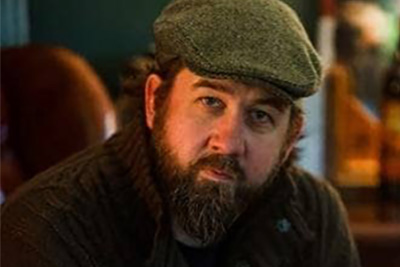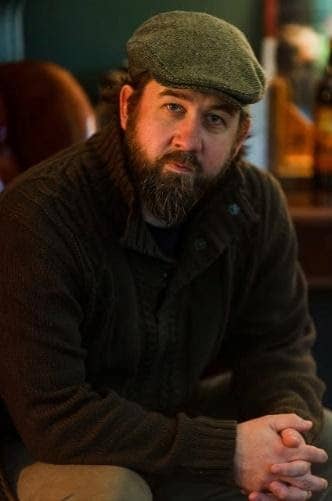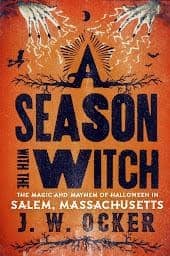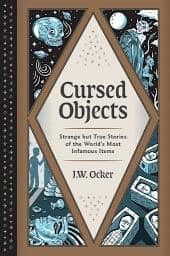Thanks for talking with us, JW. While researching Salem for my novel about a modern Salem witch, I came across your book, A Season With The Witch: The Magic and Mayhem of Halloween in Salem, Massachusetts, and loved how you captured the way Salem’s history led to the funkiness of today’s “Witch City.”
NG: What inspired you to spend a year researching Salem and a month living there?
JWO: I’d been visiting there every year since 2007 as part of my Halloween Season tradition. It’s only about 40 miles away. But I only really knew it superficially. I treated it like a pumpkin patch or corn maze. When I finished my previous travelogue, Poe-Land, I felt pretty beat up from all the travel.
I wondered if I could do a travelogue for my next book without so…much…travel? And then Salem hit me one night. I could do a stay-alogue. We could stay there for all of October, and it was such a weird city that I could still have as many adventures as a state-hopping travelogue like Poe-Land. And since I lived close, it wouldn’t be too hard on our roots when we uprooted.
NG: What do you miss about the month you spent with your family in Salem during Halloween Season?
JWO: The community there. Everybody knows everybody. Within a week, I was recognizing the faces of residents and restaurant owners. It’s a city with a small-town feel. But it’s more than a small-town feel, it’s a “we’re all in this together” feel, “all in this” being crazy tourist seasons and the spooky reputation and the witch iconography everywhere and people looking at you with smirks when they find out you live in Salem. I mean, the place has its drama, like any close-knit community, but that drama makes the place even more fun.
NG: What was the hardest part of your stay-alogue?
JWO: Knowing it was ephemeral. Knowing that I wasn’t actually part of this city. That my lifestyle during that month was temporary and in some ways a facade. I didn’t like being just a sojourner there. I still go back multiple times a year, but it’s never the same as when I was staying there. My wife and I even entertained fantasies of moving there.
NG: The life of Nathaniel Hawthorne’s weaves its way through your book, culminating with you pausing at his statue on Halloween, or what you call “H-Day.” What about his life inspires you?
I like that there is always a darkness either under or over the words of his stories. I also like that he was one of our pioneering storytellers in the country. Have a soft spot for those writers, as they created that original American voice, often while living in poverty. His life in Salem and deep connection to it (even when he loathed that connection) is also a big reason why I like him.
NG: You interviewed many experts, including the master of the Salem Marine Society, the president of the Nathaniel Hawthorne Society, and experts at the Peabody Essex Museum, not to mention ‘Steve the Vampire.’ Were there surprises in those interviews that didn’t make it into your book that you can share with us?
JWO: I think I got all the important stuff in the book, honestly, and much of it was surprising to me. I was also overall surprised that so many people were willing to talk to me, especially people like the VP of marketing from PEM and the mayor and the police chief, People with Important Things To Do answering questions from me like, “What’s it like to live in Halloween Town?”. I did have an issue with one of the witches I interviewed, where they tried to treat me like I was their PR agent and sort of demanded to direct how I was going to portray them. I had to explain to them that it didn’t work that way, and they relented.
NG: Tell us a bit about your blog, “Oddities I have Seen (OTIS)” that you can find at http://www.oddthingsiveseen.com/
Since 2007, I’ve been cataloguing my visits to the strange and macabre all over the world–oddities of art, science, nature, and culture is how I explain it, usually. And most often, I find that the oddest and most strangest things on the planet are macabre. OTIS is basically my biggest travelogue if you take them all the essays together. It’s my home on the servers.
NG: A journalist for the New York Times recently reviewed your latest book, Cursed Objects: Strange but True Stories of the World’s Most Infamous Items, and deemed it so fun it “couldn’t be put down.”
Tell us more about your sense of humor. Was your family funny? Who are your comedic favorites? (NOTE: Can we link to an Amazon purchase button?)
I’m actually not a big comedy guy. Rarely like it in movies, find standup routines uncomfortable to sit through. But I like literary wit, I think. Douglas Adams is my patron saint as far as that goes.
Plus, it’s probably a defense mechanism. The moment I start taking something too seriously, I stop sounding like myself. That means I’ve lost perspective (not saying this is true, just how I feel). I always assume that if you could know every truth about life, could see it all, your reaction would be to laugh. Maybe a sad laugh, maybe a hysterical one, maybe even a joyful one (though I doubt the last), but definitely a laugh. So, if there’s a God, he’s probably an ineffectual one because he’s too busy rolling on the floor trying to catch his breath between the thunder of laughter.






That last paragraph packs a whole lot into few words. I really appreciate the idea of looking at life and finding reasons to laugh–even if through tears. It could be my mantra. It’s nice to know I am good company.
Absolutely, Kiri!
Great interview, Nancy! I am interested in JWO’s books. Thank you for introducing me to another author.
Loved the insights into a fascinating town. I’d love to learn more about its early history.